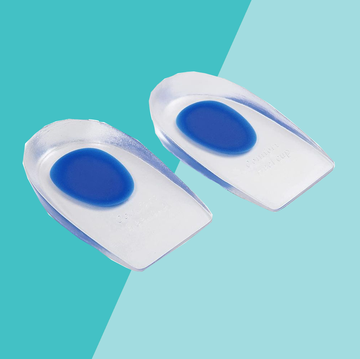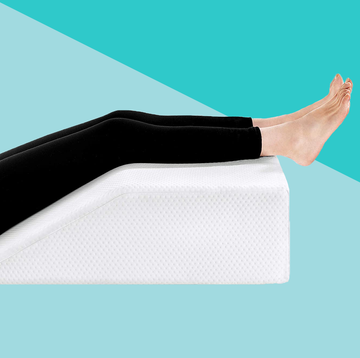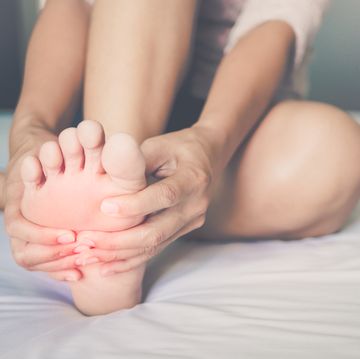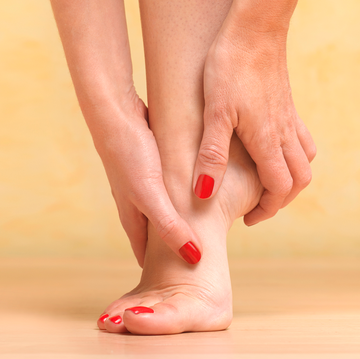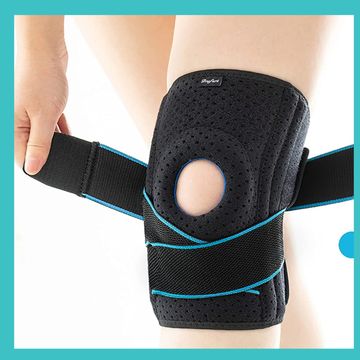- A new study found long-term use of non-steroidal anti-inflammatory drugs (NSAIDs) to treat osteoarthritis of the knee may worsen inflammation.
- The research found joint inflammation and cartilage quality were worse after four years in patients who took NSAIDs.
- Scientists say more research is needed to help determine the future of osteoarthritis treatment.
A recent study found that taking non-steroidal anti-inflammatory drugs (NSAIDs) such as over-the-counter pain relievers like ibuprofen or naproxen for joint pain due to osteoarthritis, a type of arthritis, may actually increase inflammation. Research being presented at the Radiological Society of North America annual meeting found these painkillers may worsen inflammation in the knee, according to a press release.
Researchers set out to see how NSAIDs impact synovitis, the inflammation of the membrane lining the joint that has been found to play a role in progressing osteoarthritis. They planned to examine patients who experience knee arthritis taking these medications over time. They followed 277 participants from the Osteoarthritis Initiative Cohort with moderate to severe osteoarthritis who used NSAIDs as their treatment for at least one year between baseline and a four-year follow-up. These participants were compared to 793 control participants not treated with NSAIDs.
All participants in the study had an MRI of the knee, initially and during a four-year follow-up, to track cartilage thickness, composition, and other measurements to evaluate arthritis progression. The scientists found that long-term use of NSAIDs had no benefit, and joint inflammation and cartilage quality were worse at a four-year follow-up, compared to the control group.
Painkillers are a common at-home treatment used to ease aches and pains from osteoarthritis, which is the most common form of arthritis. It affects more than 32 million adults in the U.S. and more than 500 million people worldwide, according to the press release. People most often experience pain in their hands, hips, and knees when the cartilage that cushions the joints wears away, causing inflammation and swelling.
The study’s lead author Johanna Luitjens, M.D., a postdoctoral scholar in the Department of Radiology and Biomedical Imaging at the University of California, San Francisco, says NSAIDs are very commonly used to treat pain because there is currently no therapy approved to cure or stop the progression of osteoarthritis, according to the press release. But, she notes that the impact of NSAIDs on synovitis has not previously been studied well.
“In this large group of participants, we were able to show that there were no protective mechanisms from NSAIDs in reducing inflammation or slowing down the progression of osteoarthritis of the knee joint,” Dr. Luitjens said in the press release. “The use of NSAIDs for their anti-inflammatory function has been frequently propagated in patients with osteoarthritis in recent years and should be revisited since a positive impact on joint inflammation could not be demonstrated.”
Dr. Lutijens hypothesized that those who are taking NSAIDs may be more physically active due to the pain relief, which could potentially lead to the worsening of synovitis. But, she noted that her research did adjust for physical activity in results. Additionally, it could simply be that though NSAIDs have anti-inflammatory effects, they cannot prevent synovitis. She added that more research is needed in the future.
If you’re experiencing pain and are looking for arthritis pain relief, work with your doctor to determine the best plan for you. There are some alternative pain treatments that may work better for your body and have some strong science behind them, such as warm water therapy for arthritis and low-impact physical activity such as yoga for arthritis.

Arielle Weg is the associate editor at Prevention and loves to share her favorite wellness and nutrition obsessions. She previously managed content at The Vitamin Shoppe, and her work has also appeared in Women’s Health, Men’s Health, Cooking Light, MyRecipes, and more. You can usually find her taking an online workout class or making a mess in the kitchen, creating something delicious she found in her cookbook collection or saved on Instagram.

